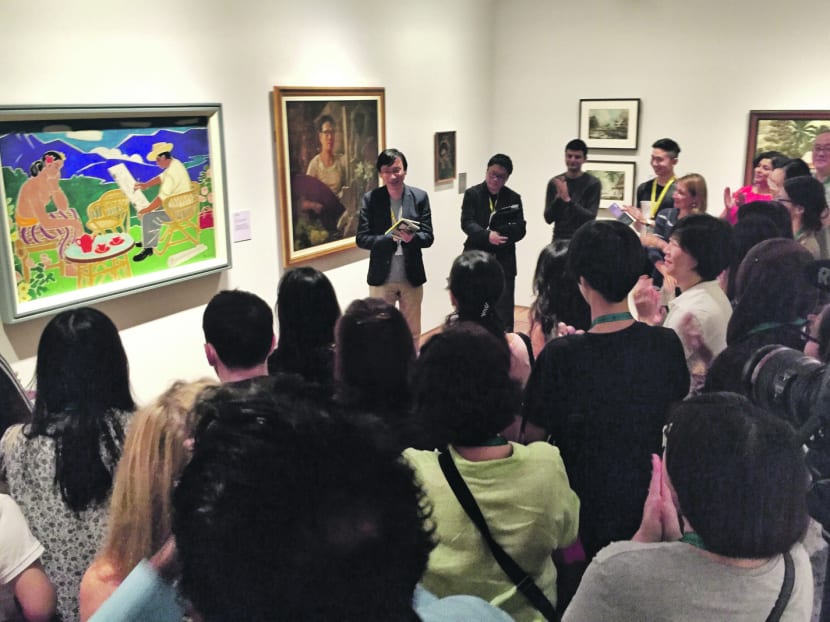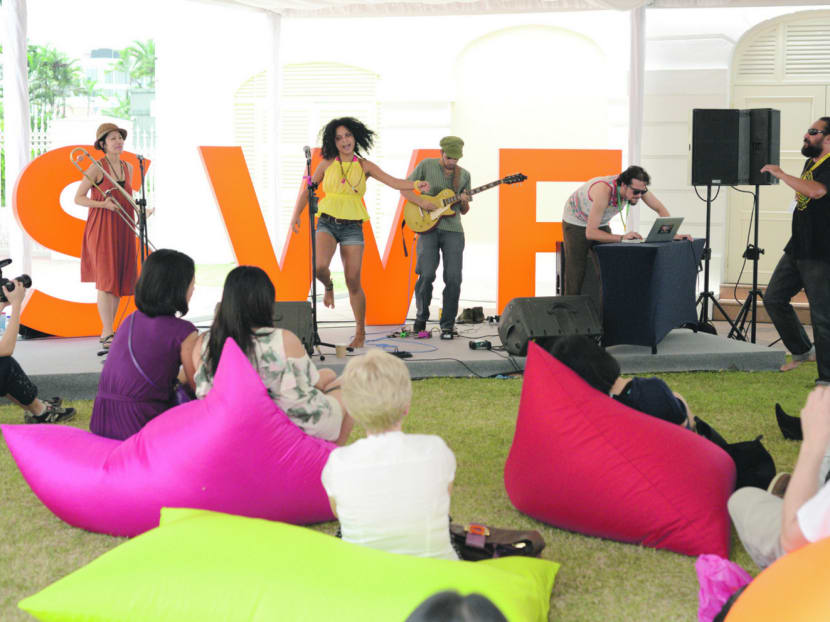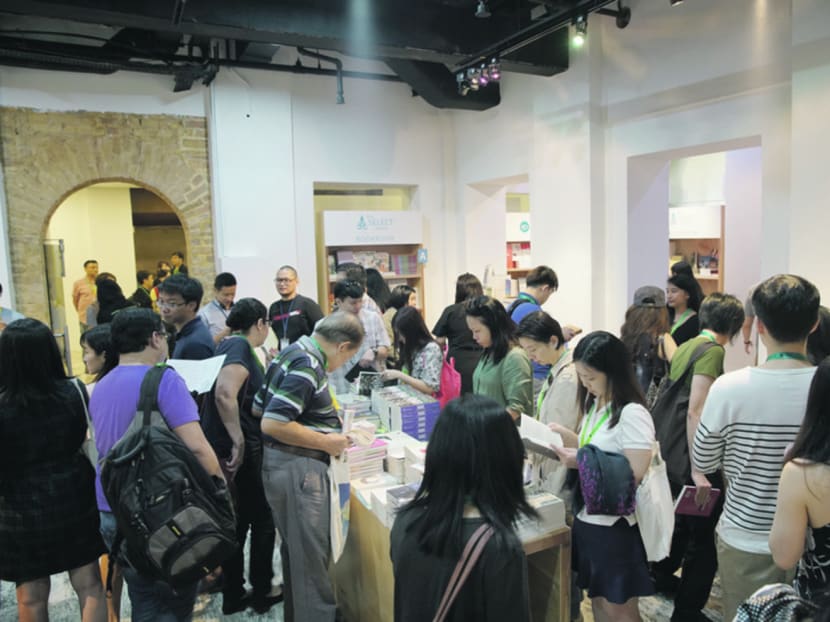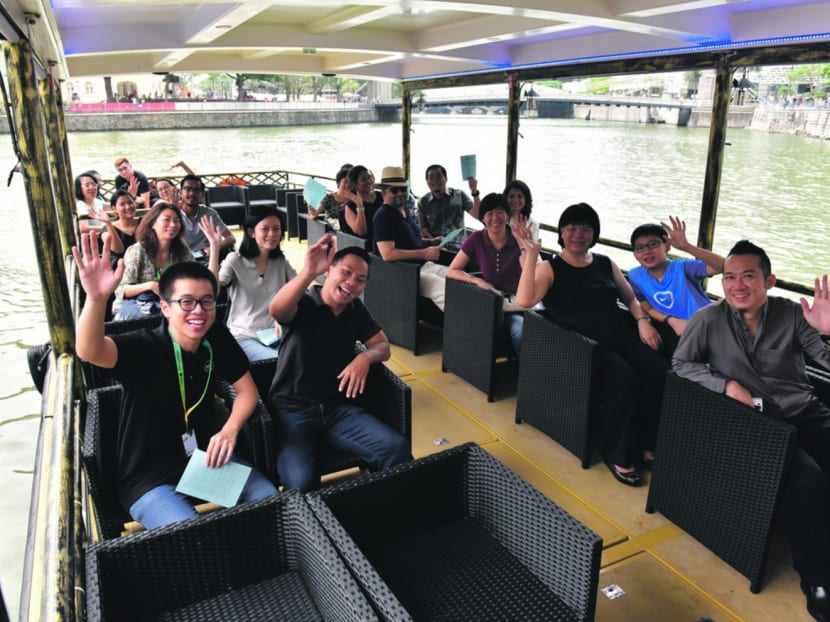S’pore Writers Fest 2015: On translations, paintings and football
As the Singapore Writers Festival (SWF) shifted into high gear during its first weekend — now back at its old The Arts House digs after being held at the Singapore Management University Green the past few years — there were events that saw Singaporean writers pondering over the state of the local literary scene, and questions about looking outwards or inwards.




As the Singapore Writers Festival (SWF) shifted into high gear during its first weekend — now back at its old The Arts House digs after being held at the Singapore Management University Green the past few years — there were events that saw Singaporean writers pondering over the state of the local literary scene, and questions about looking outwards or inwards.
And trust a Singaporean male writer to bring up football and literature in the same breath: On Saturday, poet Toh Hsien Min brought up the beautiful game in a panel discussion about getting published overseas.
He compared the process of what writers go through to get into the international circuit with how players break into the English Premier League. Toh likened the long, invisible slog that young football players face from an early age to how a writer had to pay his or her dues through constantly honing his or her craft and applying to institutions (and getting rejected). “You need to go through those 12 years of training,” he said.
But Toh also wondered if enough Singaporeans actually make that effort, citing how local publishers have seemingly “made it too easy” to get published at home. It was a cheeky comment made all the more amusing since the discussion was moderated by esteemed publisher Fong Hoe Fang of Ethos Books, who took it all in his stride.
If you can kick a ball, the S-League is going to pick you up, Toh said. “But you’re not going to get into the Premier League.”
Fellow panelist and New York-based poet Koh Jee Leong shared the difficulties of penetrating the international scene and the rewards of his own long slog — including his recent tome Steep Tea, which was published by established British publisher Carcanet. “It’s not good enough to be good enough at home,” he said.
In a sense, it was another riff of the typical “big fish in small pond, small fish in big pond” discussion.
The third panelist, poet Alvin Pang (who had co-edited the Singapore-America anthology Union, which was launched yesterday), chipped in with a point about plugging into the literary global conversation. “You must engage with the community you want to participate in,” he said.
And what if the local literary scene is not even engaging with itself?
In another panel discussion, this time on SG50 anthologies, poet-academic-editor Gwee Li Sui pointed out that Singapore’s four literary traditions — English, Malay, Chinese and Tamil — do not even communicate with each other that much. While editing the double-volume Singathology, which features 50 new works by Cultural Medallion and Young Artist Award recipients, Gwee recalled being struck by the sheer diversity of views and styles produced in the different languages and suggested we should do more to bridge the divide, not least by encouraging translations.
Translation, it seems, is the subtle undercurrent at this year’s SWF — the newly formed Select Centre, which is in charge of the festival’s bookstore, is quietly doing a parallel translation festival.
And in one of SWF’s own panel discussions and workshops on translation, bilingual writer and translator Yeo Wei Wei also pointed out the need to push for translations, citing how Singapore’s multilingual culture is a “gift”.
Getting Singapore’s fragmented readership to dip into the different literary traditions is one thing. What writers talk about is another.
In a panel about “drawing inspiration from the streets of Singapore”, moderator Madeleine Thien, a Canadian author who teaches at Nanyang Technological University (NTU) as an NTU-NAC (National Arts Council) Writer in Residence, noted how her students “don’t want to write about Singapore”.
It echoed an impassioned comment made by Epigram Books publisher Edmund Wee at last year’s edition, where he bemoaned the dearth of interesting manuscripts set in Singapore.
“Where are the novels about Tan Cheng Bock as a fictional president of Singapore, bullying in the army or even a Singapore spy a la James Bond?” he had asked then.
(It must be noted that the new Epigram Books Fiction Prize, with the winner set to be announced on Thursday, is perhaps a proactive step in grappling with the issue.)
The solution of producing more Singapore stories and getting the linguistically diverse readership here to overlap are ways of growing the literary scene. But what about reaching out beyond the scene?
Poet-fictionist Desmond Kon Zhicheng-Mingde’s Eye/Feel/Write programme was essentially a literature-meets-art tour, where he gets Singapore writers to create new pieces based on or inspired by artworks.
Last year, the tour was at the Singapore Art Museum. This year, it was at the yet-to-be-opened National Gallery Singapore (there’s another tour this Saturday). It saw the likes of Alfian Sa’at and Gwee, among others, engaging with artworks by local artists such as Liu Kang, Chen Wen Hsi and Vincent Leow.
In one swoop, the project saw a direct conversation between Singapore writers and their visual art counterparts, and the writings were in different languages (which were translated) and published in a book that could also be seen as an alternative museum “guide book” — should it be sold at the museum in the future.
And even as the project looks inward, the museum itself has partially international aspirations, with its regional and international artworks. So in a roundabout sense, the works in Eye/Feel/Write can be a way of plugging into that global conversation too.
How’s that for a hat trick?
The Singapore Writers Festival continues until Nov 8. For more info, visit http://www.singaporewritersfestival.com








